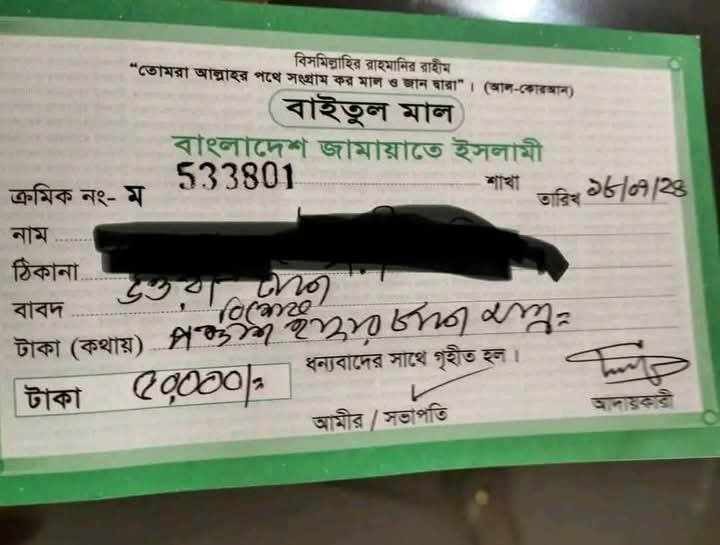In an unprecedented escalation of Islamist persecution, Jamaat-e-Islami — the Bangladeshi arm of the Muslim Brotherhood — has begun imposing the medieval Jizya tax on Hindus and other religious minorities, openly declaring its intent to replace the country’s secular framework with Sharia law. Backed by Pakistan’s ISI and linked to global jihadist networks including Al-Qaeda, Jamaat’s move comes just months after a coup that brought Nobel laureate Muhammad Yunus to power, triggering a rapid rise in radical Islamic influence. This development not only threatens Bangladesh’s fragile democracy but poses a strategic security risk to South Asia and the wider free world.
From August 1, 2025, Jamaat-e-Islami, an ideological offshoot of the Muslim Brotherhood — an organization that denounces women’s empowerment and advocates replacing democracy with Sharia law — has reportedly begun collecting Jizya from Hindus and other religious minorities in Bangladesh, according to an article by the Weekly Blitz.

On July 25, 2025, local media reported that Dr. Shafiqur Rahman, Emir of Jamaat-e-Islami Bangladesh, publicly declared that Hindus and non-Muslims must pay this tax in the same way Muslims pay Zakat. Speaking at a public gathering, Dr. Rahman stated: “Non-Muslims living in Bangladesh should be made to pay the Jizya tax. Since Muslims pay Zakat — a portion of their wealth donated for religious purposes — if equal rights are truly desired, then Hindus should pay Jizya. This is what is correct as per Sharia law”.
The Jizya is a historical tax imposed on non-Muslims in Islamic states, often viewed by critics as a symbol of subjugation and second-class status. Its collection in present-day Bangladesh marks a dangerous shift from the country’s secular founding principles toward a theocratic order.
Global context: Muslim Brotherhood under scrutiny
In June 2025, US Senator Ted Cruz introduced bill H.R.3883 — the Muslim Brotherhood Is a Terrorist Organization Act of 2025 — aimed at designating the Muslim Brotherhood as a foreign terrorist organization (FTO). This move, if passed, would have major implications for groups tied to the Brotherhood worldwide, including Jamaat-e-Islami.
Awami League concerned over Pakistanization of Bangladesh under Yunus regime
1971: Pakistan’s guilt will not go away
However, security experts caution that such a designation, while significant, would not automatically halt the Brotherhood’s global expansion. The organization has proven adept at using political, financial, and social fronts to continue its influence.
Jamaat’s troubled past and international ties
Jamaat-e-Islami opposed Bangladesh’s war of independence in 1971, siding with Pakistan and actively collaborating with the Pakistani military during the genocide of Bengali civilians. Today, the party enjoys continued patronage from Pakistan’s Inter-Services Intelligence (ISI) as well as various Islamist and jihadist organizations.
In the West, Jamaat maintains deep ties with the Council on American-Islamic Relations (CAIR) and the Islamic Circle of North America (ICNA). According to the Observer Research Foundation, these Jamaat-linked organizations have succeeded in securing funding from U.S. federal agencies — particularly USAID, the Department of Agriculture, and the Federal Emergency Management Agency (FEMA).
Demand for return to East Pakistan, led by Yunus-Azmi, growing in Islamabad, Dhaka
How Yunus gang is trying to weaken the Bangladesh Army
Sam Westrop of the Middle East Forum has documented that millions of dollars have flowed to US-based Islamist groups with alleged terror connections — a trend that continued even during the Trump administration.
Bangladesh’s dangerous turn toward theocracy
Since last year’s regime change coup, Bangladesh’s secular political foundations have been eroding rapidly. Under interim head of government Muhammad Yunus, radical Islamist groups have grown emboldened, openly pushing for the transformation of the country into a theocratic state.
This vacuum has allowed ISIS and Al-Qaeda to expand their regional presence. The ISI, seeing a “golden opportunity”, has intensified its subversive operations in both Bangladesh and its neighboring countries.
In recent months, Al-Qaeda operatives and other Islamist extremists have increased their activities in Bangladesh. Last week, Major (sacked) Ziaul Huq Zia — a notorious Al-Qaeda-linked terrorist and one of the US State Department’s most wanted fugitives — openly called for establishing offices of insurgent movements from Manipur, Khalistan, and Kashmir inside Bangladesh.
Brig Azmi’s Dark Plan: Islamizing army, unleashing suicide squads on India
Pakistan Army officers land in Dhaka, will sit with Arakan Army
Zia, believed to have secretly returned to Bangladesh after last year’s jihadist-backed coup, made his statement in a Facebook post. Strangely, shortly after his post was publicized, the US State Department’s website quietly removed its announcement of a US$5 million bounty on him.
The alarming implications
The imposition of Jizya by Jamaat-e-Islami is not an isolated incident. It is a clear signal that Bangladesh’s religious minorities are being systematically targeted under a creeping Sharia-based agenda. This action not only violates the secular principles enshrined in Bangladesh’s 1972 Constitution but also undermines international human rights norms.
The silence of the current interim administration on this matter raises troubling questions: Is this the beginning of state-sanctioned religious persecution in Bangladesh? And if so, how far will it go before the international community intervenes?
If the Jizya tax collection is allowed to continue unchecked, Bangladesh risks sliding into a medieval-style religious apartheid, where Hindus, Christians, Buddhists, and other minorities are reduced to second-class citizens in their own country. This development is not just a domestic issue — it is a warning to the world about the resurgence of militant Islamism in South Asia. The international community, particularly democratic nations that value religious freedom, must act decisively before Bangladesh becomes yet another cautionary tale of a secular state devoured by theocratic extremism.